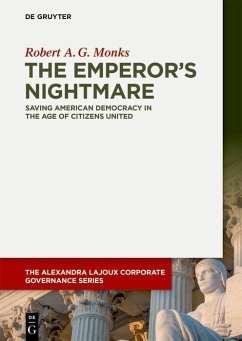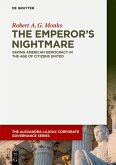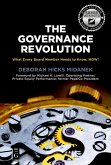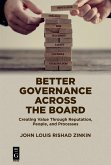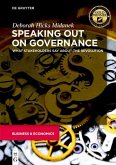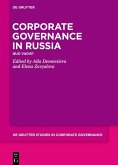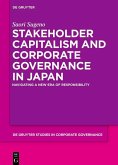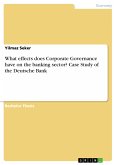In Restoring the Integrity of the Corporation, Hans Christian Anderson's wonderful fairy tale, The Emperor's Nightingale, is included as the Prologue, and serves as an allegory for the return of the corporation to serving the needs of its stakeholders.
Combining Monk's firm grasp of corporate governance and his intense study of complexity, he describes how corporations behave through the stages of their life cycles. From angry shareholders to concerned chief executives, almost everyone knows at a gut level that the present system is not working. This book attempts to explain why. Better yet, it proposes a path for positive change.
Table of Contents
Prologue
A Fable: The Emperor's Nightingale.
1 The Emperor's Nightingale: Harbinger of Corporate Restoration
Humankind and all its creations struggle to reconcile the predictable and the dynamic. This is the moral of the timeless story of 'The Nightingale' by Hans Christian Andersen. It is also the nature of the corporation, a human creation of special importance.
2 The Disconsolate Dawn of the Modern Corporation
Two hundred years ago, Adam Smith sounded an alarm. The corporations of his day posed a threat to society because by their very nature they sought unlimited life, size, power, and license, externalizing risk as they pursued these aims.
3 Four Corporate Dangers
Smith's insights give us our way in to see corporations for what they really are. Corporations are not human, although they are formed by humans and should serve human purposes. Nor are they machines, although they have some internal laws that operate mechanistically. Instead, they are artificial life forms - or, to use a current scientific term, complex adaptive systems.
4 The Limits of Conventional Corporate Wisdom - and How to Surpass Them
We are in denial about the corporate problem. Seven panaceas prevent us from finding the solution to the problems inherent in the modern corporation: the CEO 'philosopher-king', corporate chartering, independent directors, well-structured boards, independent experts, the free press, and multiple external constraints. Taken separately, each of these can lull us into dangerous complacency. Taken together - along with the actions of independent, informed, motivated, and empowered shareholders - these elements are transformed from panaceas to solutions.
5 The Corporation and the Economy as Complex Adaptive Systems
Like all complex adaptive systems, corporations have both regularities (predictable, mechanistic laws) and dynamics (forces for change). Corporate regularities, which are shared by other manmade institutions, are the drives for unlimited life, size, power, and license. Corporate dynamics, which are shared by all CASs, are multiplicity, spontaneity, accommodation, adaptation, transcendence, and metamorphosis. These dynamics can counterbalance the four corporate dangers of unlimited life, size, power, and license - bringing instead long-term life, appropriate size, balanced power, and greater accountability to long-term owners.
6 Modeling Corporate Accountability
Agent-based computer modelling can advance our inquiry. Our 'Brightline'
Executive Summary
model represents, among other factors, the dynamics of externalization in interactions among four key agents in the large publicly held corporations: customers, corporations, government, and shareholders. Companies compete for customers by reducing their liabilities through externalization. An aggressive management that is compelled by its shareholders to function within government-determined limits on externalization will generate superior values over the long term.
7 Intermezzo: The 'Four Phases' of Corporate Life
Analogizing to 'cellular automata', we see that there may be 'classes' of corporate life: doomsday (Class I), stagnation (Class II), chaos (Class III), and true orderliness (Class IV). In many runs of an automata model, only the first three classes emerge. From time to time, however, true order imposes itself at the brink of chaos. Is the corporate world poised for positive change in this sense? Will our 'Class II' stagnation be followed by 'Class III' conditions, or by true order, the desired 'Class IV?' To make such a shift, active shareholders may be the agent needed.
8 Stone & Webster: A Journey to the Edge of Chaos
The Stone & Webster story shows how apt the cellular automata analogy can be in a single company. In this case, stagnation (Class II) could have been followed by chaos (Class III). Fortunately, active shareholders moved the company toward orderliness (Class IV).
9 The New Owners
Institutional shareholders, the key agents in fiduciary capitalism, are not monoliths. Institutions elect, pay, and work their trustees in different ways. Conflicts of interest and investment horizons also vary. Of all institutional shareholders, private pension funds show the most promise. They and other funds need to find their 'voice' as New Owners.
10 The New Language
The New Owners are universal, long-term, global, and humane fiduciaries. They can use their unique status to follow three important imperatives, identified 20 years ago by David Engel: (1) obey the law, (2) inform the public about the corporation's impact on society, (3) minimize corporate involvement in politics. Laws are not perfect, but they are the corporation's best proxy for justice. The New Language of ownership takes this justice into account, even as new idiom continues to evolve in dialogue with management's more traditional language of profit optimization.
Conclusion: The Restored Corporation in the New Millennium
Listening to the beautiful truth of the nightingale, we are 'tolled back' to our true selves. We can wind up the golden bird of short-term profit maximization, or welcome back the nightingale of long-term economic value rooted in the social good. Which will it be?
Epilogue: The Nightingale Sings
Robert A. G. Monks, Founder and Chairman of ValueEdge Advisors, USA
Dieser Download kann aus rechtlichen Gründen nur mit Rechnungsadresse in A, B, BG, CY, CZ, D, DK, EW, E, FIN, F, GR, HR, H, IRL, I, LT, L, LR, M, NL, PL, P, R, S, SLO, SK ausgeliefert werden.

